- Home
- Michael Crichton
Venom Business Page 4
Venom Business Read online
Page 4
“Poisonous? Very. Very, very, very.” He sipped his ginger ale and smacked his lips. “Among the most poisonous known. They are members of the species Xanthus, indigenous to the Yucatán jungle.”
“Fascinating,” she said, looking down the aisle, as if she wished to leave.
“Oh, quite,” Raynaud said. He rubbed his hands together. “Are you aware that one ounce—one ounce, mind you—of their venom could kill all the inhabitants of a small city? That no more than one hundred molecules of venom can paralyze a healthy man for life?”
The stewardess nodded numbly.
“The venom,” Raynaud explained, “does not work by the usual methods of depolarization of the neuromuscular junction or interruption of axonal coupling. Nor is there an oxydative-phorphorylation effect. Rather the venom contains an enzyme, phosphogluconase. It’s important in intermediate metabolism. Carbohydrate entry into cell membranes. Shift of receptor sites, that kind of thing.”
“You seem to know a lot about it,” the stewardess said.
“Oh, yes,” Raynaud said. “You see, snakes are my life.”
2. PARIS
IN THE STERILE, GLASS-AND-STEEL confines of Orly Airport, he talked with the customs officer. He spoke French badly, as suited a zoology professor.
The customs officer glanced at Raynaud’s bags and said, “You will be long in France, Monsieur?”
“Two months.”
“On vacation?”
“Yes, but also business.” He handed the man his import license. The customs officer scanned it quickly.
“It is for that?” he asked, pointing to the box.
“Yes.”
“I must call.” He went to a phone nearby. Raynaud looked down the line of other waiting passengers, talking with different customs officials. And then he recognized a familiar face.
Arriz.
It was incredible: he was certain Arriz was dead. There had been several reports, yet here he was, in the flesh, going through French customs.
Without a disguise, either, Raynaud saw. Christ, Arriz had guts.
And obviously a bad passport, because the customs man studying it was lingering, looking at each page. Finally he paused and held the page with the photograph up to the light.
“Monsieur,” said the customs man, “I am afraid this passport is not—”
Raynaud did not wait. In a moment he had slit the tape which held his box closed, and allowed one of the snakes to fall out onto the floor. A woman saw it and screamed.
“Back everyone,” Raynaud said, making a great commotion. “Everyone back. They are very poisonous.”
The snake slithered over the baggage and slipped down behind the customs area. There was great noise and confusion now. Raynaud scrambled after his snake. A young girl began to cry loudly. A little boy chewing gum laughed and pointed to it; he tugged at his mother’s skirts to get her attention. The mother saw it and fainted.
Several minutes passed before he was able to retrieve his snake and get it safely back into the box. When he looked up, Arriz was gone.
The customs man down the line realized it too. “Stop that man!” he shouted.
Raynaud looked over. Arriz was walking quickly out through the lobby, toward the waiting taxis.
“Stop him!”
The guards ran, and so did Arriz. He sprinted into a taxi, slammed the door, and roared off. Probably with a gun at the cabby’s ear, Raynaud thought.
Raynaud’s own customs man came back, after a lengthy conference on the phone. He had missed all the excitement. Meantime an airport official was berating Raynaud in rapid French about the dangers of animals improperly caged; how could Raynaud be so clumsy? Raynaud was trying to make apologies in his slow French with a bad accent when the customs man cut in.
“Monsieur Raynaud. Come with me, please.”
There was a moment of silence.
“Is something wrong?” Raynaud said.
“Your animals,” the customs man said. “They must be checked.”
“But my license—”
“They must still be checked.”
Raynaud sighed. The customs man said, “Bring your bags, and follow me.”
Raynaud followed. He had not expected this; in theory the customs people were supposed to take one quick, horrified look and pass him by. He trailed behind the customs man as they moved down a corridor, away from the tourist arrival area. Finally they came to a door marked IMPORTATION. The man opened it without knocking, and waved Raynaud inside. The room contained a bare desk, and a chair. There was no one in the room.
“Please wait here, Monsieur Raynaud.”
“Docteur,” Raynaud corrected, in his best priggish style. He allowed himself to show some irritation over the proceedings.
The man was contrite. “Pardon, Docteur. If you would be so kind, have your import license and passport ready. It will be just a few moments.”
The door closed. Raynaud was alone.
He smoked a cigarette and looked around the room for an ashtray. Finding none, he ground it out on the floor.
Another man entered the room. He was heavyset and jovial, wearing a gray uniform, not the tan uniform of customs officials.
“Docteur Raynaud. Sorry to inconvenience you.”
“Not at all,” Raynaud said, rather stiffly.
The man stepped behind the desk. “Your documents, please.”
Raynaud handed them over. The man studied them briefly and tapped the import license with his finger. “Snakes, eh?”
Raynaud nodded.
“In the box?”
“Yes.”
“It is unfortunate,” said the man, “that one of them should have slipped out back there. It caused a great commotion.”
“I apologize,” Raynaud said. “You see, the tapes were weak. The Mexicans insisted on examining the contents.”
“The Mexicans,” the man said with a laugh. “They are so absurdly suspicious. May I ask why you are bringing these snakes to France?”
“I am a Professor of Zoology. I am delivering these to the Institut des Etudes Reptiliennes.”
“I see,” the man said.
He opened the desk drawer and removed a thick brown manual. He thumbed through it and for a moment Raynaud thought he was looking up the Institut. That would be a disaster, because the Institut des Etudes Reptiliennes did not exist.
But the man smiled and said, “Ah, here we are. Rules governing importation of reptiles. Category seven, snakes.” He ran his finger down the page. “They are not intended as pets?”
“Good Lord, no. They are extremely poisonous. Purely scientific research.”
“Yes. Here we are. Research purposes.” He read for a moment, shrugged, and closed the book. “There is no problem.”
This seemed to conclude the official business. He reached into his pocket. “Cigarette?”
Raynaud took it. The man lit it for him, and grinned. “Actually,” he said, “this is all because of Artur.”
“Artur?”
“The customs man. He hates snakes, can’t bear the sight of them. That was why he had you sent here. Normally we handle other problems—dogs without the proper shots, that kind of thing. Monkeys with a virus.”
Raynaud sucked back the harsh smoke from the Gauloise cigarette, savoring the taste. But he remembered at the last moment to cough convincingly.
“Too strong?” the man asked.
“Just not used to them,” he said.
The official pointed to the box. “There remains a final formality,” he said. “May I see them?”
“The snakes?”
“Please.”
“Of course,” Raynaud said. “But stand back, they are quite deadly.”
He slipped the seals and opened the lid slowly. The customs man glanced inside quickly, then nodded.
“All right,” he said, “that’s fine.”
Ten minutes later, after a short lecture on being careful not to let them loose again, Professor Charles Raynaud was in
a taxi, headed toward Paris.
He found a room in the Hotel Villefranche, a modest pension on the Left Bank, which he judged suitable for a zoology professor. While signing in, the manager regarded the cardboard box with suspicion and gave Raynaud another lecture on the snakes. Raynaud promised he would guard them securely.
In his room, he placed the suitcase on the bed, and the box alongside it, then went to dinner. The manager recommended a café around the corner, and it was not bad. Raynaud had boeuf bourguignon, and looked at the flaking paint on the ceiling. It amused him to look at the ceiling and to think that in another few days he would be dining at La Tour d’Argent.
After dinner, he used the restaurant telephone to make a call.
“Monsieur Graham, please.”
A neutral voice said, “Who is calling?”
“Doctor Raynaud.”
“One moment, please.”
There was a short pause, then, “Monsieur Graham requests your presence at lunch tomorrow. One o’clock for one-thirty. Is that satisfactory?”
“Perfectly,” Raynaud said, and hung up. He waited a moment and then dialed another number.
It rang four times before an angry voice said, “Merde, alors.”
In fluent Parisian French, Raynaud said, “Information, please.”
“Who calls?”
“A friend.”
“What price?”
“A thousand francs.”
“New or old?” The voice laughed sarcastically.
“New.”
“What information do you seek?”
“I want to find Arriz.”
The voice laughed again. “Arriz is dead.”
“Arriz is alive.”
“You are mistaken; he is dead.”
“Find him. A thousand francs. I will call again.”
Raynaud hung up. He had put the call through to Vito Mantini, known locally as the answer man. Vito dealt in information; he knew everything about everybody. He did not, of course, know as much as Arriz, but he might be able to find Arriz. And Arriz was very important.
Whistling, Raynaud left the restaurant and returned to his hotel. It was now nearly midnight; he went to his room and stared at the cardboard box on the bed. It was a perfect time to finish the job. He opened the box and allowed the snakes to slither across the bedspread and across the carpet.
He patted one on its flat black head.
“You did well,” he said.
The forked tongue, pink and smooth, flicked out. Looking at the snakes, he thought to himself that they were terribly, repulsively ugly. They were of the species Recanthus, known to the Yucatán natives as humpsnakes, because of the way they raised part of the body just behind the head into a hump as they moved forward.
“I’ll be sorry to see you go,” he said.
He opened his shaving kit and removed a long, sharp razor. He felt the edge with the ball of his thumb, and looked at the snakes. Two were crawling over the carpet; the third remained in the box.
“Sorry,” he said.
With his bare hands, he picked up one and carried it into the bathroom. The snake was nearly four feet long; it coiled around his wrist and forearm. He held it behind the head, and watched the slit eyes and flicking tongue.
He placed the neck on the edge of the washbasin, and then, with a swift movement, brought the razor down. The blade cut through the flesh, met crunching bone, and then the head dropped into the basin. The body, decapitated, writhed with considerable and frenzied power. Purple-blue blood spurted from the cut. He struggled for a moment to remove the coiled body of the snake from his arm. He let the remains twitch in the bathtub while he went out to get the next.
The second snake was more wary, but with a firm grasp, he caught it behind the head, and carried it to the bathroom. The procedure was repeated, the body left to writhe in the tub. He returned for the third, and then it happened.
The third snake, still in the box, sank its fangs into the back of his hand.
It hurt like a cigarette burn—a moment of stunning pain, an instant of heady dizziness. He dislodged the snake’s head, and pulled it away from his bleeding hand.
“Bastard,” he said. Angrily, he carried it into the bathroom, and cut off the head as he had the others. Then he returned to his suitcase and found a Band-Aid.
The snake had cut deep, but fortunately it was not poisonous. Though ugly, these snakes lacked the ability to produce sufficient venom to be harmful to man, though they were deadly to small rodents. He placed the Band-Aid over the symmetrical twin punctures in his hand, and sat down to wait.
Within minutes, the area around the punctures became swollen and inflamed. Then the numbness started—first locally, in the back of his hand, and then extending up his forearm to the elbow. He found he had trouble moving his swollen fingers.
He lit a cigarette, and relaxed. He was not frightened; this had happened to him before, in the jungle. The natives all believed that smoking a cigarette helped things. Raynaud had once mentioned it to a doctor, who said it was possible. Something about nicotine constricting vessels and slowing the spread of poison.
Half an hour passed. He smoked three cigarettes, and went in to look at the bodies. The bathroom was bloody; two of the bodies were still moving, twisting and coiling in the tub. He knew they might continue this spastic motion for as long as an hour after death, and he could do nothing until they stopped.
Sometime after one o’clock, the numbness in his arm began to recede, replaced by a tingling sensation. He went to check on the snakes and found them lifeless; he collected them quickly, slipping them into a paper bag. He closed it, and went outside.
In the cool Paris evening, it was a short walk to the Seine. After the heat of Mexico, the air seemed almost cold, and he shivered as he walked. He waited until he was alone, out of sight of lovers and wanderers. Then he dropped the bag into the water. It struck the surface, and sank instantly.
It was finished.
On the way back to his hotel, he bought a bottle of red wine in a cafe, and drank it as he cleaned up the mess in the bathroom. Then he went to the cardboard box, removed the stuffing, the sawdust, and the reptile droppings, and lifted up the false bottom.
No one had noticed that the bottom of the box was three inches shallower than the outside dimensions. They had been too interested in the snakes. Now Raynaud looked at two carefully packed artifacts of great value: a Mayan necklace of gold and jade, from the Classic period, and a figurine in the shape of a seated, blind man, from the Pre-Classic period.
He lifted out the treasures, and held them to the light. They were truly beautiful: flawless, perfect, marvelous.
He felt sure that Monsieur Graham would be pleased.
Raynaud finished his wine, undressed, and got into bed, but he was too excited to sleep. He lay on his back in the dark and stared at the cheap flowered wallpaper in the room. He wondered which hotel he should move to in the morning: the Ritz, or the George Cinq?
He finally decided on the George Cinq. It was more expensive. Besides, J. D. Barrett had once mentioned that he had stayed there.
Raynaud had mixed feelings about Barrett. Barrett was a friend, a tempter, an accomplice, and a customer all mixed into one odd package. Raynaud had met him shortly after his own arrival in Mexico at the age of twenty-three, fresh from flunking out of Yale and two years in the Army language school. At the time, Raynaud was working on the excavations as a translator and foreman; Barrett had come to Yucatán as a tourist.
He was a huge, hearty Texan with thick hands, a red face, and a bulging wallet. He was in oil, which he referred to as “the business,” as if there were no other, and he had come on a tour from San Antonio to see the ruins. Barrett sweated profusely in the Yucatán heat, and was forced to change clothes several times a day; his friends joked about it, but he did not seem to care.
Late one afternoon, Raynaud had been in Henri’s Valladolid hotel bar when a group of tourists arrived. Among them was Barrett. I
n his loud way, the Texan struck up a conversation.
“You work on the ruins,” he said.
Raynaud nodded.
“Must be damned fascinating. Buy you a drink?”
Raynaud nodded.
“Tequila?”
“Tequila.”
“Two tequilas,” Barrett said. He turned to Raynaud. “You’re young. What the hell you doing screwing around in Mexico?”
“Just a temporary job,” Raynaud said.
“It goes nowhere,” Barrett said.
“That’s occurred to me,” Raynaud said.
“Unless, of course, you have some angles.”
The drinks came. They drank them with lime and salt.
“You know,” Barrett said conversationally, “I collect art.”
“Paintings?”
“Some. Mostly native art. I’m kind of a nut on it, always have been. I have a private collection.”
“I see,” Raynaud said.
“A private collection means that you don’t have to show it to anybody—any authorities, or people like that.”
“I’m not sure I follow you,” Raynaud said.
Barrett reached into his wallet and withdrew a card with his home address and phone.
“We private collectors,” he said, “pay good money for high quality merchandise.”
“It’s illegal to—”
“That,” Barrett said heavily, “is why we pay such good money.” He got up from the bar and scratched one drenched armpit. He reached into his wallet again. “Pay the bartender, would you? Keep the change.”
He gave Raynaud a hundred-dollar bill.
“No, really, I couldn’t—”
Barrett leaned close, and rested a powerful hand on Raynaud’s shoulder.
“Don’t be a damned fool,” he said, and sauntered off. One year later, almost to the day, Raynaud crossed the border with a girl named Allison. She was an extremely pretty girl with a large chest and a small, tight sweater. The customs people were so interested in her that they never bothered to wonder if she might be sitting on a box containing a Pre-Classic figurine in the shape of a coiled serpent.
It was in excellent condition; Barrett paid four hundred dollars for it.
That was several years ago, and since then Raynaud had been doing a steady but small business. He quickly established safeguards: he sold nothing to tourists within the country, but transported everything out of Mexico himself. In doing this, he learned quite a lot about customs officials.

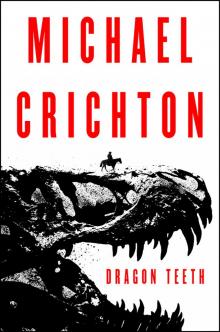 Dragon Teeth
Dragon Teeth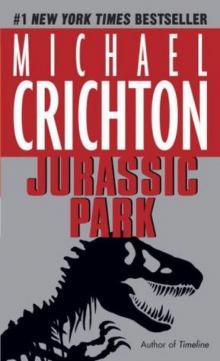 Jurassic Park
Jurassic Park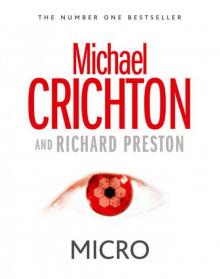 Micro
Micro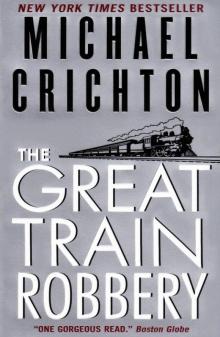 The Great Train Robbery
The Great Train Robbery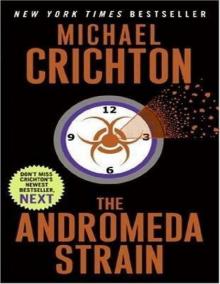 The Andromeda Strain
The Andromeda Strain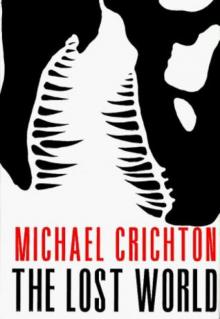 The Lost World
The Lost World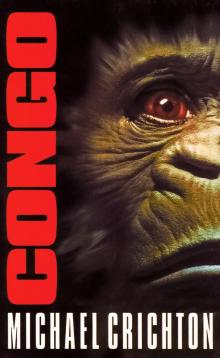 Congo
Congo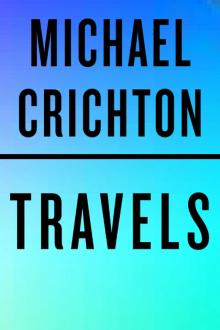 Travels
Travels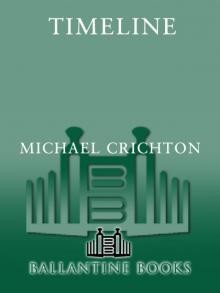 Timeline
Timeline Sphere
Sphere Westworld
Westworld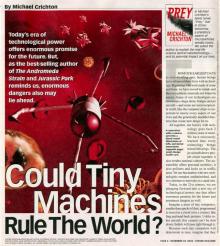 Prey
Prey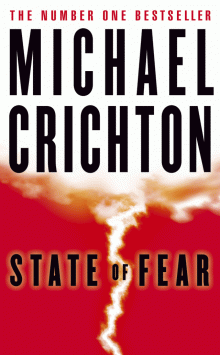 State Of Fear
State Of Fear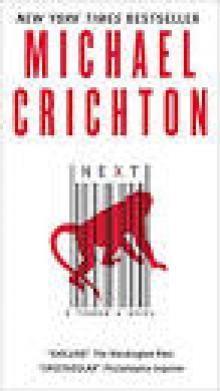 Next
Next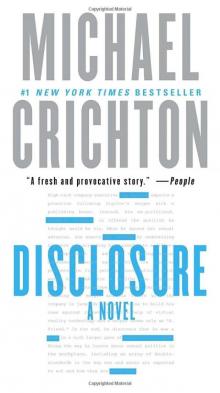 Disclosure
Disclosure Pirate Latitudes
Pirate Latitudes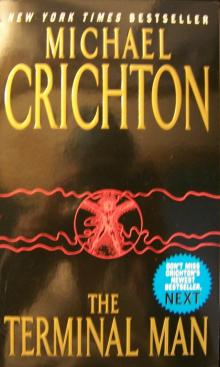 The Terminal Man
The Terminal Man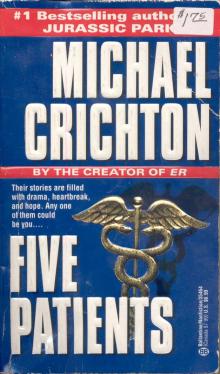 Five Patients
Five Patients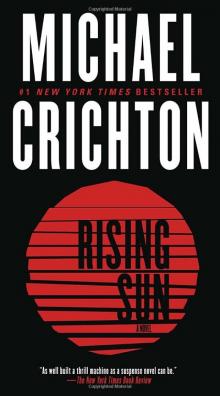 Rising Sun
Rising Sun Binary
Binary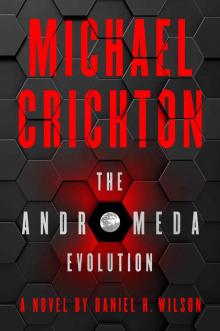 The Andromeda Evolution
The Andromeda Evolution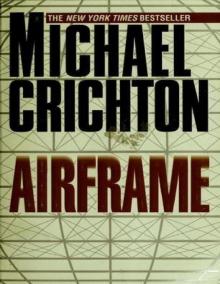 Airframe
Airframe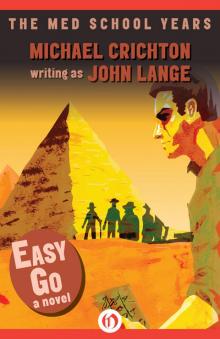 Easy Go
Easy Go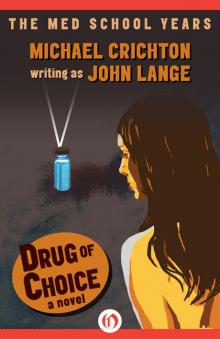 Drug of Choice
Drug of Choice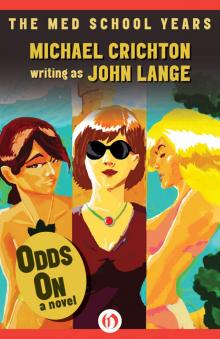 Odds On: A Novel
Odds On: A Novel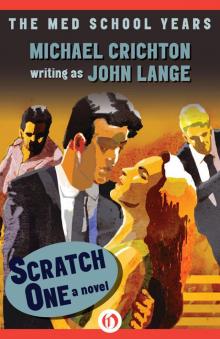 Scratch One
Scratch One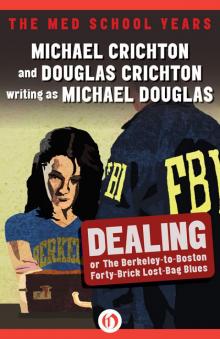 Dealing or The Berkeley-to-Boston Forty-Brick Lost-Bag Blues
Dealing or The Berkeley-to-Boston Forty-Brick Lost-Bag Blues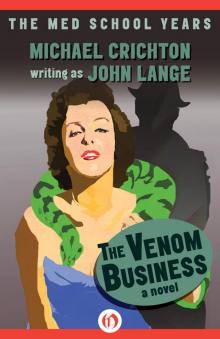 Venom Business
Venom Business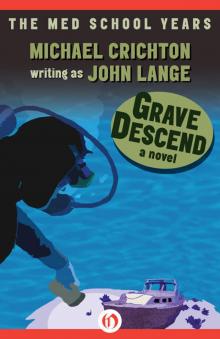 Grave Descend
Grave Descend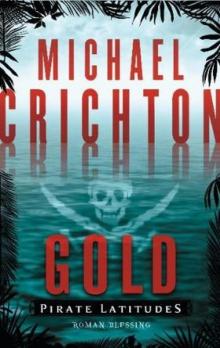 Gold - Pirate Latitudes
Gold - Pirate Latitudes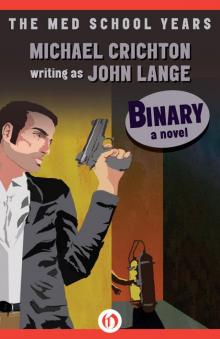 Binary: A Novel
Binary: A Novel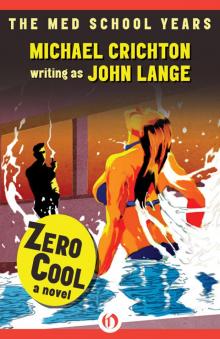 Zero Cool
Zero Cool Delos 1 - Westworld
Delos 1 - Westworld